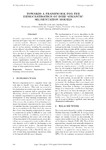Towards a framework for the democratisation of deep semantic segmentation models

Ver/Abrir
Use este enlace para citar
http://hdl.handle.net/2183/31413
Excepto si se señala otra cosa, la licencia del ítem se describe como Atribución-NoComercial-CompartirIgual 4.0 Internacional (CC BY-NC-SA 4.0)
https://creativecommons.org/licenses/by-nc-sa/4.0/deed.es
Colecciones
Metadatos
Mostrar el registro completo del ítemTítulo
Towards a framework for the democratisation of deep semantic segmentation modelsFecha
2022Cita bibliográfica
Escobedo, R., Heras, J. (2022) Towards a framework for the democratisation of deep semantic segmentation models. XLIII Jornadas de Automática: libro de actas, pp.980-984 https://doi.org/10.17979/spudc.9788497498418.0980
Resumen
[Abstract] Semantic segmentation models based on deep learning techniques have been successfully applied in several contexts. However, non-expert users might find challenging the use of those techniques due to several reasons, including the necessity of trying different algorithms implemented in heterogeneous libraries, the configuration of hyperparameters, the lack of support of many state-of-the-art algorithms for training them on custom datasets, or the variety of metrics employed to evaluate semantic segmentation models. In this work, we present the first steps towards the development of a framework that facilitates the construction and usage of deep segmentation models.
Palabras clave
Semantic segmentation
Deep learning
Democratisation
Deep learning
Democratisation
Versión del editor
Derechos
Atribución-NoComercial-CompartirIgual 4.0 Internacional (CC BY-NC-SA 4.0)
https://creativecommons.org/licenses/by-nc-sa/4.0/deed.es
ISBN
978-84-9749-841-8






